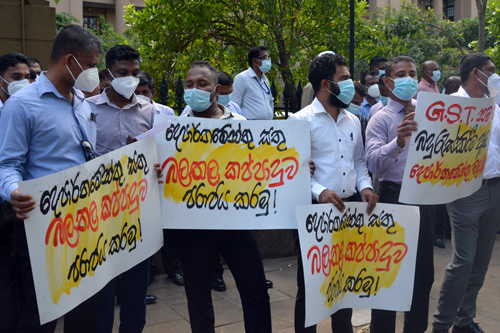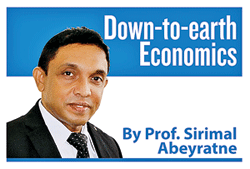Corruption at the dawn of 2023
View(s):
Protests by trade unions. Will they be equally alert against unbridled corruption?
“What has brought most Third World countries down, and what has led to their failure in development, has been corruption! So, Lee Kuan Yew after he became Prime Minister of Singapore, made it a point to punish not the junior people but the very senior people. A Deputy Minister went on holiday with his friend, a businessman. When he came back, he was arrested. He asked why he was being arrested and he was told, ‘you went on holiday with a businessman and the latter paid all your expenses and that is corruption. You will go to jail’. So, when a Deputy Minister was sent to jail, everybody said ‘oops … I got to be careful. I can also go to jail’. That honesty factor is one critical reason why Singapore has been exceptionally successful.”
This quote is from a speech made by Prof. Kishore Mahbubani, who served as a Singaporean diplomat as well as later as the Dean of the Lee Kuan Yew School of Public Policy at the National University of Singapore. He was speaking of how Singapore fought corruption and, how that effort has been instrumental in raising Singapore from being a Third World country to a First World country.
By per capita GDP, which was reported as US$72,700 in 2021, Singapore is today the richest country in Asia and the Pacific region. It has overtaken the traditionally richest countries in the region – Australia in 1993 and Japan in 2007. Today, Australia’s per capita GDP is $60,000, and Japan’s $39,000.
Minister’s suicide
The strategy of the Singaporean leadership to fight corruption has worked well. As a result, there are not many instances of corruption, even at higher levels involving politicians and bureaucrats, reported from Singapore. As per the quotation, “eliminating corruption at top-level has been critical for Singapore to become exceptionally successful”.
A similar incident, as reported in The Straits Times of Singapore on 27 March 2015, was the bribery case of the Cabinet Minister of National Development, Teh Cheang Wan, which ended up with the Minister’s tragic suicide on 14 December 1986. The Prime Minister kicked off the parliamentary session on 26 January 1987 surprising the Chamber by reading out the suicide note of the Minister, addressed to him. He revealed for the first time that the Minister was being investigated for a bribery case and, emphasised that there is no way a minister can avoid investigations.
 An excerpt from the suicide note, as reported in The Straits Times, is as follows: “I have been feeling very sad and depressed for the last two weeks. I feel responsible for the occurrence of this unfortunate incident and I feel I should accept full responsibility. As an honourable oriental gentleman, I feel it is only right that I should pay the highest penalty for my mistake.”
An excerpt from the suicide note, as reported in The Straits Times, is as follows: “I have been feeling very sad and depressed for the last two weeks. I feel responsible for the occurrence of this unfortunate incident and I feel I should accept full responsibility. As an honourable oriental gentleman, I feel it is only right that I should pay the highest penalty for my mistake.”
This week, there was news from Maldives which inspired me to bring up the Singapore story. The Maldivian Criminal Court has fined the former President Abdulla Yameen $5 million and sentenced him to 11 years imprisonment after finding him guilty of corruption and money laundering. Yameen, who has served a five-year term in 2013-2018 as the President of Maldives until he was defeated at the elections in 2018, was to be the opposition Progressive Party of Maldives (PPM) candidate for the next election due in 2023.
The Sri Lankan case
Our opening stories from Singapore teach valuable lessons to us in Sri Lanka as well as many other developing countries in Asia. They have been pretending to be struggling to become a First World country like Singapore, but never doing what Singapore did. If we don’t want to do what Singapore did in combatting top-level corruption, it’s difficult to expect us to perform like Singapore and become a First World economy.
Sri Lanka is now known for institutionalised corruption from top to bottom and widespread. Corrupt practices are not strange in any society, but visionary political leaders find ways to fight it and eliminate it. But in some countries, such as Sri Lanka, corruption is tolerated; what you tolerate, you nurture it and, you nurture it until you can’t either tolerate or eliminate it. Sri Lanka is now almost at this level so that most of the corruption practices that we heard over the past 2 – 3 decades were never investigated or concluded.
If we don’t eradicate corruption at top-level, you will never be able to address it at lower levels. That’s why Singapore’s leadership addressed it first at the top, before extending investigations to lower levels. When the top level is corrupt, they need to appoint their trusted friends and relatives to the key positions in order to defend the corruption mechanism. Therefore, it is not surprising to see kith and kin of the top-level running the government agencies and institutions, irrespective of their competence to do so.
Area never reformed
Sri Lanka is internationally known for corruption. Let me quote some of the evidence to back that. The least-corrupted top-five countries in the Asia Pacific region are New Zealand, Singapore, Hong Kong, Australia and Japan; interestingly Bhutan from South Asia is the sixth least-corrupted country in the region. Sri Lanka is a ‘more-corrupted’ nation and remains now below Malaysia, China, India, Vietnam and Indonesia.
Status of corruption is essentially reflected through the “rule of law” with its enforceability and impartiality. According to the International Report on Economic Freedom in the World, Sri Lanka’s poorest performance is in the areas related to the rule of law, including impartiality of courts, judicial independence and reliability of Police. Apart from that, this is an area where Sri Lanka has never made any deliberate attempt to reform throughout the past 40 years.
Then there is the inclusion of “reducing corruption vulnerability” into the forthcoming IMF programme. The IMF Press Release on 1 September 2022 states the following as one of the seven points of its Staff-Level Agreement: “Reducing corruption vulnerabilities through improving fiscal transparency and public financial management, introducing a stronger anti-corruption legal framework, and conducting an indepth governance diagnostic, supported by IMF technical assistance”. Accordingly, we are expected to fight corruption, but have we taken it seriously? Or are we expecting to go to IMF again for the 18th time as well?
New Year greetings!
An important question that we must pay attention to is how corruption retards development, in addition to its shameful reputation that it carries for the nation in front of the world. In corrupt countries, institutions to deal with corruption are paralysed and politicised, allowing political decisions to overrule institutions. Resulting policy and regulatory uncertainty retard investment flows. Corrupt countries are lethargic to implement reforms and improvements (including automation) because the lack of reforms allows corruption to flourish.
Corrupt leaders appoint their kith and kin to the key positions, who work for their appointers and, not for the institutions and the country. Finally, the lack of confidence in such corrupt countries weakens potential business environment.
We spent the most difficult and tragic year of the post-independent history of the country and, commences a new era with the dawn of 2023. The Budget 2023 also says that this is the year that we begin our new journey to become a “developed country” by 2048, when we celebrate 100 years of Independence. Sri Lanka has 25 years to go!
We will not be moving forward reaching that goal, if we don’t fight corruption, which has become “institutionalised” now. Dealing with corruption is not a political decision. It requires purposive and bold reforms to strengthen our democratic institutions dealing with the rule of law with its enforceability and impartiality.
(The writer is a Professor of Economics at the University of Colombo and can be reached at sirimal@econ.cmb.ac.lk and follow on Twitter @SirimalAshoka).
Hitad.lk has you covered with quality used or brand new cars for sale that are budget friendly yet reliable! Now is the time to sell your old ride for something more attractive to today's modern automotive market demands. Browse through our selection of affordable options now on Hitad.lk before deciding on what will work best for you!


